Barbara Rainey's Blog
June 9, 2025
The Wonder of the Word

As some of you know, for the last few years I have pursued a degree from Dallas Theological Seminary. One of my courses, The Story of Scripture, was a high-level look at the entire Bible as God’s story to us. My professor gave us the creative assignment of writing our own interpretation of His story in any medium—a song, a painting, a mural, or whatever we could dream up.
I’ve become interested in poetry in the last few years so I excitedly took that last creative option and ended up writing a 30-page book called, The Wonder of the Word: Meditations in Rhyme on the Story of God’s Love. As I shared the completed poem with the Ever Thine Home staff everyone agreed we should make it available to our readers.
The Wonder of the Word: Meditations in Rhyme on the Story of God’s Love is a beautifully illustrated poem, thanks to the help of my friend Julie, that tells the story of Scripture from Genesis to Revelation. I hope this little book will help you take in the whole of the Bible so that you feel the deep love of God through each victory and struggle of His people throughout the ages.
In 30 pages, The Wonder of the Word tells a beautiful story of a beautiful Creator who longs to have a relationship with each and every person. It was a joy and a labor of love to write. I learned so much in writing and putting it together and hope that you might be inspired and learn from it as well.
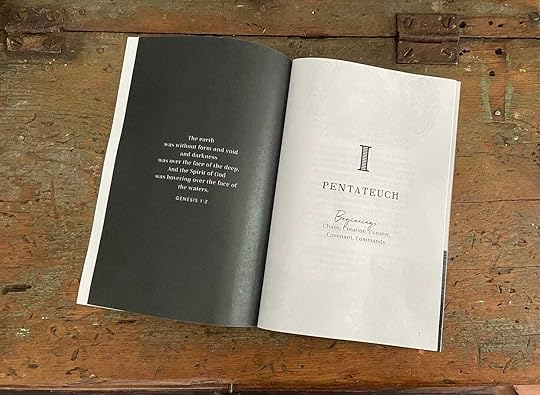
Here’s a brief excerpt to give you an idea of what’s inside:
Pentateuch Beginnings. Chaos. Creation. Contest. Covenant. Commands.God. Spirit hovered. Chaos. The Word spoke. Then: Light and lights, life and kinds multiplied. Adam made, named, slept. God formed; Eve woke. How Triune God fashioned me from man’s side.With beauty pure and God, they walked and dwelt; harmony, freedom, no shame was theirs. See sly enemy stalk. Both listened, both knelt. How I too with them rebelled against Thee.Eden. Lost. Sin and death aggregated. Noah, one upright imperfect man found in the whole world deteriorated. How God promised: a multi-colored vow.Sin remained. God called Abram, declared: “Leave.” Promised land, offspring, blessings; with an oath made by Covenant. By faith just believe. How I watch Him call Jew and Gentile both. Surprise Isaac. A miracle. A type, foretelling the foresworn coming Savior. Abraham fully obeyed, raised the knife. How God will give His Son to deliver.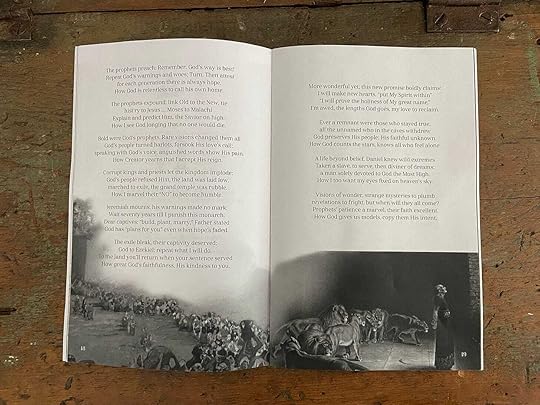
For a minimum donation of only $16, you can get a copy .
The post The Wonder of the Word appeared first on Ever Thine Home.
June 2, 2025
The Holy Spirit is My Purifier: He Makes Me More Like Jesus


Years ago we had neighbors with children about the ages of our middle kids. One of them was an angry child who knew bad words and used them at times. He played rough with our kids and found kindness difficult.
The mama bear in me wanted to protect my little cubs. But I also wanted to have a positive influence on our neighbors, so I chose to continue letting this child come over to play occasionally while I closely supervised the interactions. When needed I had conversations with my children after he went home.
Even with my noble intentions, over time I began to dislike our little neighbor’s presence, attitude, and actions more and more. Anger was growing in my heart. I knew Jesus wanted me to love him, but in truth I didn’t want to love this child. In my mind, behavior like this didn’t deserve to be rewarded with grace and love.
One day I realized my attitude and my lack of love was not pleasing to my God. The Holy Spirit showed me the truth about my attitude. The Spirit was inviting me to let Him make my heart more pure and clean like Jesus, who loved even those who hated Him.
As a member of the Trinity, part of the Holy Spirit’s job is to “sanctify” me, to purify me, to make me more holy. “Sanctify” means to set apart from that which is evil and not like God.
God commanded His people, Israel, to be holy in Leviticus 11:45. He repeated the instruction to us in 1 Peter 1:16, “You shall be holy, for I am holy.” Jesus demonstrated how to love and forgive and be holy toward those who didn’t deserve it—which meant everyone. We are called to be like Him.
Even though God knew He was asking the impossible of His sinful children, nevertheless He asked, knowing He was giving us the ability to become holy by the power of His Spirit. He initiates this relationship and then gives us what we need to please Him.
Here are some Scriptures that speak of this ongoing purifying work of the Spirit:
· The Spirit calls and urges us to become holy … “For God has not called us for impurity, but in holiness. Therefore whoever disregards this, disregards not man but God, who gives his Holy Spirit to you.” 1 Thessalonians 4:7-8
· The Spirit makes us holy by giving us His divine nature … “His divine power has granted to us all things that pertain to life and godliness … he has granted us His precious and very great promises, so that through them you may become partakers of the divine nature.” 2 Peter 1:3-4
· He purifies us by giving us the fruits of the Spirit, giving us the power to be loving, peaceful, kind, patient, etc., especially in difficult circumstances (Galatians 5:22-23).
· He purifies us so we become more like Christ … “Now may the God of peace himself sanctify you completely, and may your whole spirit and soul and body be kept blameless at the coming of our Lord Jesus Christ.” 1 Thessalonians 5:23
· He convicts us of sin which means He shows or helps us see our sin … “And when he [the Holy Spirit] comes, he will convict the world concerning sin and righteousness and judgment.” John 16:8
The Holy Spirit convicted me that my attitude toward our neighbor child was sin. It was not a holy response because I was responding out of my own human nature, which is compromised, broken, set on serving self. I needed God’s divine nature to rule over my own nature so that I could then become sanctified and holy.

Once I see what the Holy Spirit has shown me about my heart, I have a choice to either refuse out of pride or to surrender to Him and His desires, which are for my good and for the good of others. It is then, when surrendered to the will of the Spirit, that my motives can become pure.
With our neighbor child, I knew my opinion, my sense of what was right, didn’t matter before a holy God. Jesus loved this child and died for this child as much as He did for me. My proud heart could only be changed by Jesus.
The Spirit delights to help all of His children recognize our naturally sinful responses. Only He can produce purity in a surrendered human heart. One of my role models, Elisabeth Elliot, said, “One doesn’t surrender a life in an instant. That which is lifelong can only be surrendered over a lifetime.” So be encouraged that our inability to stay surrendered is normal!
I surrendered to the whisper of the Spirit and prayed God would give me His love because mine was insufficient. I asked Him to remove the coldness in my heart and replace it with His love that was pure, kind, patient, compassionate, did not act unbecomingly or take into account a wrong suffered.
To my great surprise, I discovered soon after I prayed that my animosity toward this child was gone. I didn’t cringe when I saw this little one walk down our driveway. I began to feel compassion instead of anger. My eyes were opened to see it wasn’t all the child’s fault. His home life was a significant factor.
What I experienced was the work of the Holy Spirit, my Purifier, who loved me enough to show me the truth about my heart and possessed the power to change me. I experienced the truth of Romans 5:5: “… God’s love has been poured into our hearts through the Holy Spirit who has been given to us.”
After I saw what God could do with my heart over a neighbor child, I began asking Him to help me love others, like my own children when they weren’t so easy to like. Or my husband on some days, because let’s be honest … those closest to us are those whose flaws we see most clearly. They hurt us and disappoint us more often than others.
Changing a cold, hard, stubborn heart is a miracle of God. Why? Because we humans have a free will. No other living creature resists His voice. But we can resist the desire of God’s Spirit to change our hearts.
I pray God will grant you the desire to be more like Him and the willingness to see your sin and surrender to His work in your heart.
Reflection
1. Who are those you have a hard time loving? Whose name suddenly popped into your mind as you read this question? If no one’s name was obvious then review your family, your co-workers, your neighbors, and those you know in church. Be willing to be brutally honest with yourself. Remember God already knows anyway. These relationships are between you and Him alone.
2. Talk to the Holy Spirit about these people. Tell Him how you feel if you want. But most importantly, surrender your inability to love to God and invite His Holy Spirit to change your heart. It’s a liberating wonder to experience heart change! There’s nothing like cooperating with God.
3. To learn more here are five verses about the desire of God to make us pure and holy as He is.
· 1 Corinthians 13
· Galatians 5:22-23
· Philippians 4:8
· Matthew 5:8
· 1 John 3:3
As you read these, remember it is impossible for you to change yourself. Only God can create a new heart that is holy and pure like His.
The post The Holy Spirit is My Purifier: He Makes Me More Like Jesus appeared first on Ever Thine Home.
May 5, 2025
Eastertide Week Three: Remember His Last Words
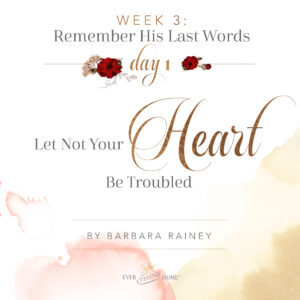


My granddaughter Sophie is now two. Her every need has been met from the moment of birth, the evidence of which is my daughter’s ongoing mommy-fatigue. Little Sophie’s two older siblings have enjoyed the same lack of want, and resultant lack of worry. Millions of orphans and street children have never known a parent who imitates a providing God, described by David as “The Lord is my Shepherd … I shall not want” (Psalm 23:1).
Jesus, our Good Shepherd, knows our every need. To the multitudes, He taught, “Therefore do not be anxious, saying, ‘What shall we eat?’ or ‘What shall we drink?’ or ‘What shall we wear?’ … But seek first the kingdom of God and his righteousness, and all these things will be added to you” (Matthew 6:31,33). Finding all we need comes from looking to a Heavenly Father. Jesus demonstrated that He Himself lived this way, fully trusting His Father to guide and provide. It’s the kind of trust little ones like Sophie possess naturally with attentive parents.
But we don’t naturally trust as Jesus did. Why? Trust in God died when Adam and Eve rejected God’s plan for their lives. Sin altered human DNA forever, leading to death. Among other physical, intellectual and psychological changes, everyone’s emotional makeup became unbalanced.

This is why Jesus came—to redeem and restore a world full of broken sinful people to our original condition. While on earth He saw the fallout of sin with human eyes and felt the impact of damaged human emotions.
Why does this matter?
The crux of the Christian faith stands on the identity of Jesus Christ who is eternally begotten not made, one person with two natures, fully God and fully man. It matters that we know He fully feels our hurts, pains and losses. If He didn’t, our God would be distant, callous to our suffering, and unmotivated to help.
But His fully human body knew real limitations, like the need for sleep, food, and shelter. His fully human body also felt all the emotions we feel, for we are made in His image. Hebrews 4:15 (NASB) describes Jesus as: “… One who has been tempted in all things as we are [fully man], yet without sin [fully God].” Jesus understands.
He gets me. He gets you. And He longs to help.
In the last two weeks of Jesus’s life the word “troubled” is used of Him or by Him three times in John’s Gospel and once each by Matthew and Mark. First, He was troubled when standing at the tomb of Lazarus (John 11:33). Why? It seems probable that Jesus, as fully God who is Love, felt deep compassion for and with Mary and all those who were loudly lamenting Lazarus’s death. He might also have been grieving the entrance of sin into this world He created which resulted in death (Romans 5:12). As a result, “Jesus wept” (John 11:35).
Second, following His triumphal entry to Jerusalem on Palm Sunday, an experience of great joy and celebration, Jesus began to talk again about His death and John records him saying, “Now is my soul troubled …” (John 12:27). We call an experience of great joy followed by deep anxiety an “emotional rollercoaster.” Jesus knew that, too.
Third, Jesus became troubled over the knowledge that Judas would betray Him (John 13:21). Though He knew it was coming, He dreaded it still. He’d invested in Judas as much as the other disciples. He felt anxious and sad.
And finally, in the Garden of Gethsemane, His last minutes before His arrest, Jesus’s emotions were extreme. Matthew wrote He began to be sorrowful and troubled (26:37), while Mark wrote “greatly distressed and troubled” (14:33). Then Jesus said, “My soul is deeply grieved …” (Mark 14:33, NASB), a different Greek word meaning terror, alarm, and anguish.
But most interestingly, in the midst of the Last Supper and before His Garden experience, Jesus twice repeated a new command to us, “Let not your heart be troubled. Believe in God; believe also in Me” (John 14:1), and then, “Let not your hearts be troubled, neither let them be afraid” (14:27). Was Jesus speaking from personal experience? Was He saying, “I know what it’s like to be in agony, to be terrified, to be so anxious as to feel trapped with no way out?” Yes, I believe He was.
Jesus never spoke on His own initiative but only as the Father directed Him, so hear the voice of a Father in Heaven who loves you more than you can imagine saying to you: “I know how you feel, I know fear and panic and terror. You … can … trust Me, your Father. Because Jesus trusted Me with His life, and He endured more than you ever will, let not your heart be troubled.”
When emotions rule. When fears control. When grief seems it will never end. God is saying, believe in Me. Believe in My Son Jesus. We love you. Love is why Jesus came to rescue you.
Again, the Spirit of God repeats these words to our hearts. After the Resurrection the disciples were gathered in a room with the doors locked for fear of the Jewish authorities. Suddenly Jesus appeared in their midst and He said, “Why are you troubled, and why do doubts arise in your hearts?” (Luke 24:38).
Those words are for you and me today, we who are living after the Resurrection. God is calling us to live resurrected lives that trust Him like my little grandchildren trust their parents—without fears, without anxiety, without a single concern.
Today if you face emotions of discouragement or doubt or fear that threaten to take you off course, will you talk to Him about them? He knows how you feel.
May you trust the Spirit within you to give you a calm trust in God, the Three-in-One.
Because He is Risen!
We’d love to hear from you! Just leave a comment using the button below.
The post Eastertide Week Three: Remember His Last Words appeared first on Ever Thine Home.
April 15, 2025
Why I Like Easter More Than Christmas


Every year the world celebrates the Incarnation, the beyond-comprehension truth that Jesus set aside His deity and willingly became a single microscopic cell inside the pitch black of Mary’s womb. Think about it. The immense eternal Light of the World willingly buried His light for nine months. At His birth, Jesus, our eternal God, appeared as a warm, cuddly baby.
But without the cross, Christmas would mean nothing. We know that is true, but …
Christmas gets all our attention. My attic declares this overindulgence by the number of plastic bins stacked one on another, filled with Christmas decorations. Does yours, too? How many bins dedicated to Easter’s celebration do you bring out every year? The point is we Christians are following the world’s emphasis rather than the Bible’s emphasis.
Easter is not about a birth, but a death, which begs the question: When was the last time you wanted to gaze on a bloody, mangled body? Is the thought even too much? The answer: yes.
We turn away because it’s too much to absorb. It’s so much easier to celebrate a baby’s birth.
Even though we understand Easter’s facts, we eagerly anticipate and prefer Christmas. The story of the teenage virgin who bravely birthed a tiny baby king is a much happier one. Our hearts long to drink in the newness, the hope wrapped in downy soft newborn flesh.
Most of us give Easter little thought, time, or preparation. Like the sudden appearing of a rabbit in early spring, Easter sneaks up on us as we are recovering from Christmas’ excess. As a result, we take a minimalist approach to celebrating the greatest event of history. Like the blind following the blind, Christians have adopted softer, gentler symbols for Easter: bunnies, chicks, chocolate candies in colorful plastic eggs, and pastel clothing.
Do you feel the difference between these two events?
This is the conundrum of our Christian faith—that Jesus was born to die. The innocence of His birth stayed with Him to His last breath on the cross. There He hung—naked, tortured—and there He died. Willingly, He endured all of this for us because of infinite love.
Because of this difficulty we falter, not knowing how to celebrate Easter. The necessity of a blood sacrifice isn’t welcome in daily conversation. The sweetness of the Christmas babe being lullabied by His angelic choir is easier to embrace.
We, the redeemed, have wrongly reversed our affections. We ignore what Jesus commanded us to do–remember His death (1 Corinthians 11:23-26). He never asked us to commemorate His birth, which means we are not following our Savior’s instructions.
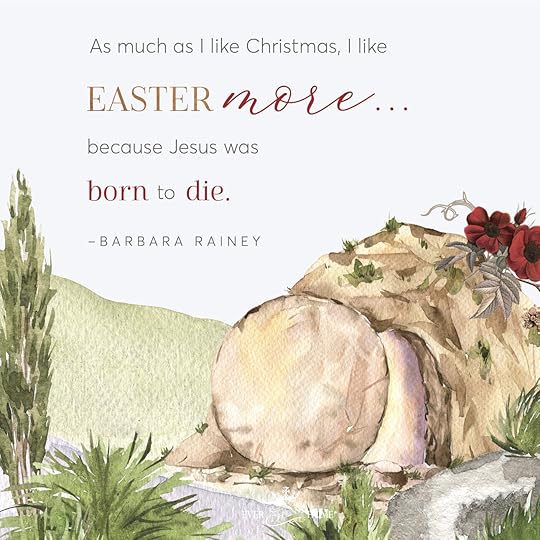
The more I’ve learned about Holy Week, Good Friday, and the miraculous events of Jesus’s entire life leading up to Easter, the more I’ve come to understand how central Easter is to our faith. As much as I like Christmas, I now like Easter more … because Jesus came to die. He accomplished salvation for you and me and that is why Easter must be celebrated with more effort and enthusiasm!
Here are four ways to begin correcting our upended thinking:
1. In your home, fully display the importance of this holiest of holidays. The true colors of Easter are red, white, and gold … not springy hues of pink, yellow, and lime green. Remember His blood, the color of red wine; remember His risen appearance, blinding and dazzling white; remember His victory worthy of a crown of gold!
This year consider wearing all white or shades of off-white and soft khaki on Easter Sunday. Set an all-white table with lots of white candles for your Resurrection Day feast to remember the purity of His life and death. Or center your table with a white lamb to celebrate our future as His bride at our marriage to the Lamb when we will be dressed in “fine linen, bright and pure—for the fine linen is the righteous deeds of the saints” (Revelation 19:8).
2. Worship with exuberance what Christ has done for us on Resurrection Sunday. Can you imagine what the women who went to the tomb felt when they saw Jesus alive? What about the disciples, and the multitudes? Like a groom who first sees his bride, I imagine beaming faces, tears of happiness, pure delight, and overflowing joy. And I picture dancing. Psalm 149:3 invites us to “praise His name with dancing, making melody to Him with tambourine and lyre!”
This is the kind of worship the Resurrection calls for. Does your Easter day look like this? It should. St. Augustine wrote, “Learn to dance, so when you get to heaven the angels know what to do with you.” I want to be ready. Will you join me?
3. Celebrate the sacrifice and miracle of Easter with others. When we understand more of the immensity of His sacrifice, our gratitude will lead to a celebration—with laughter and music and feasting—far surpassing that of Christmas.
Get creative! Make your Easter party grand, and if weather permits, have your lunch or dinner feast outside with lights and music and revelry. Invite friends and neighbors just as we do at Christmas. Easter, the celebration of the cross and the Resurrection, should be a time of contagious, overflowing evangelism.
N.T. Wright wrote, “Easter is about the wild delight of God’s creative power … we ought to shout Alleluias instead of murmuring them. We should light every candle instead of only some. Is it any wonder people find it hard to believe in the Resurrection of Jesus if we don’t throw our hats in the air? This is our greatest festival. Take Christmas away and in biblical terms you lose two chapters at the front of Matthew and Luke. Take Easter away and you don’t have a New Testament; you don’t have Christianity.”
4. Continue focusing on Easter after Resurrection Sunday. This year we’re offering three weeks of Eastertide email devotions on my Substack site. I wrote these to help myself and you remember in the days between Easter and Pentecost, a total of 50 days, many of the wonders of Jesus’s life, death, and Resurrection.
I hope you will join me in lengthening your celebration of Easter by reading the daily devotions I wrote for Eastertide. Click here to subscribe to Substack and we’ll send you these devotions.
Incarnation and Resurrection are inseparably linked. Our celebrations of these miraculous events need to be proportionate and more balanced in our focus and attention. Don’t shy away from Easter, instead elevate it to the status it deserves. Your faith and that of others will benefit. As John Coe, professor at Biola University, writes, “As I grow older in the faith, I find that I am invited by the Spirit to learn to give up the project of moralism, of trying to fix myself by my spiritual efforts. Rather, I want to open myself more deeply to Christ’s work on the cross and the work of the Spirit in my life.”
Awed by the cross, Easter truly is my favorite holiday.
I hope you’ll join me and others in focusing on the miraculous wonders of Easter and become #easterpeople too! The heart of Christianity is not what we must do, but what He has done! For us!
Christ is risen!
Christ is risen indeed!
Hallelujah!
The post Why I Like Easter More Than Christmas appeared first on Ever Thine Home.
April 7, 2025
7 Ways for Your Family to Experience the REAL Easter


Did you know that bunnies and chicks have nothing to do with Easter?
What a surprise!
Yes, I know that they are the focus of most Easter celebrations. They are comfortable and cute … unlike the cross and death at the center of the real Easter.
What Jesus accomplished on the cross is the pivotal moment in all of history, the greatest victory of all. As Easter week approaches, here are seven ways to make Holy Week and Easter Sunday meaningful, memorable, and worthy of the attention and celebration the Resurrection deserves.
1. Have your kids reenact Palm Sunday. Help them use fabric or construction paper for costumes and palm branches. Make a Hosanna banner to hang across the fireplace mantle or a doorway of your living room for the performance. Review the story in Matthew 21:1-11 to find roles each family member can enact. Then have an adult read the story of Jesus’ triumphal entry as the children act it out, and end with a prayer of gratitude.
2. Buy seven 3-inch pillar candles and then purchase and download the DIY candle wraps in our ETSY store to apply to the candles. Arrange them down the center of your table or along a fireplace mantle or on a tray in your kitchen.
During Holy Week follow these steps for meaningful daily devotions beginning on Palm Sunday:
On Palm Sunday light all the candles (1-6) except the seventh that says, “I AM the Resurrection and the Life.” On this day read John 6:35, 51. Talk together about what it means that Jesus is the Bread of Life. Then blow out all the candles.
On Monday, light candles 2-6 (all but the Bread of Life and the Resurrection and the Life). Read John 8:12 and talk together about why it’s important that Jesus is the Light of the World. Pray and then blow out the candles.
On Tuesday, light four candles (3-6), then read John 10:9. Talk about doors and why we need them and how Jesus is like a door. Why did He describe Himself that way? Then blow out the candles.
On Wednesday, light three candles (4-6), read John 10:14-15 and talk together about Jesus as our Good Shepherd. Pray and extinguish your candles.
Thursday’s Scripture is John 15:1 and 5. After lighting two candles (5-6), talk about vines, how grapes grow on vines, and what they need to flourish. How is Jesus like a vine? Pray again together and blow out the candles.
On Good Friday light the remaining candle and read John 14:6. This verse contains a trinity of names Jesus uses for Himself. Talk about what they all mean to us as His disciples. Pray together and blow out the candle. It is a somber day worth our honor and remembrance.
On Silent Saturday, light no candles, and if you plan ahead, buy a piece of black fabric to drape over your row of candles to symbolize the death of the light of the world.
On Resurrection Day light all seven candles and read John 11:25. Make this a day of celebration and joy, for the greatest miracle of all time has accomplished our salvation!
3. Use Resurrection Eggs to help your kids learn about Easter. God has used this resource to help millions of children understand the Easter story.
4. Watch the film Jesus together during Holy Week to feed our image-driven minds a picture of the awe-inspiring life of Jesus as He taught, loved, healed, and then died for you and me. The film is free for streaming online at jesusfilm.org.
5. Attend a Good Friday service. If your church doesn’t have one, go to another local church’s services. Gathering with other believers in a time of reflection and truth of what Jesus did for us the day He died on the cross will add greatly to your Easter experience.
6. Make Silent Saturday a day of mourning. Keep your blinds pulled or lights off all day to remind everyone that the Light of the World was extinguished on the cross. Help your family feel a sense of the loss and devastation the disciples felt the day after their Savior had died.
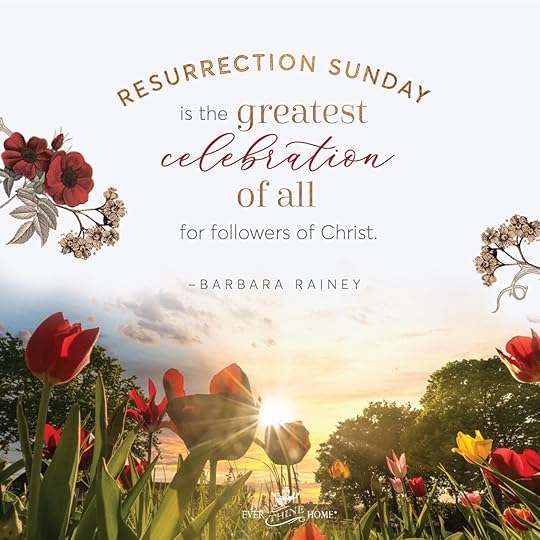
7. Celebrate BIG on Easter Sunday! Wear all white to remember our heavenly attire one day and to symbolize we have been washed white as snow by the blood of the Lamb.
Plan a beautiful table setting with an all-white table, using the seven candles mentioned in idea number two above. Use lots of red rose petals on your table to represent His blood during Holy Week. Place vases of white roses or tulips on your table early Sunday morning to declare “Christ is risen” to everyone present!
End your Easter gathering with friends and family for a party with lots of balloons, sparklers, music, or any kind of festivities you can imagine.
Resurrection Sunday is the greatest celebration of all for believers in Jesus. Without the cross we would have no hope and Christmas would be meaningless. Because of what Jesus accomplished for us, let’s celebrate and worship with exuberance so all the world knows Jesus is alive forevermore!
Be sure to visit our Etsy store for different Easter resources to help you focus on the real meaning of Easter!
The post 7 Ways for Your Family to Experience the REAL Easter appeared first on Ever Thine Home.
March 31, 2025
Resurrection Cards: Learning About the Intricately Orchestrated Pinnacle of Human History
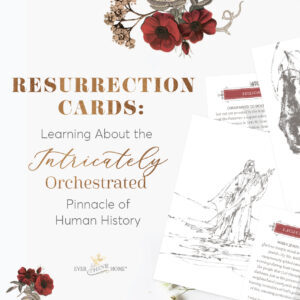
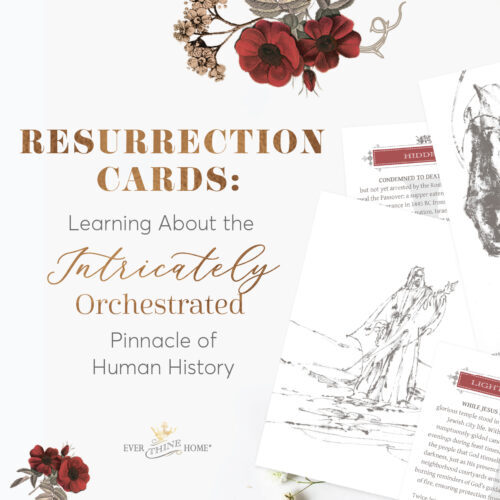
Did you know Jesus never asked us to celebrate His birthday? But we do … lavishly and extravagantly. But if we have Christmas and Easter out of proportion in our world, and we do, how can we elevate Easter this year? How do we balance our celebrations of these two world-changing events?
Today we’ll look at some important details surrounding the first Easter, followed by an easy but profoundly meaningful way to bring this story to life for yourself and your whole family.
For starters we must remember that Jesus, His parents, siblings, disciples, and friends were all Jewish. Like a warm current in the cold ocean, the people of Israel, Jesus’s people, moved to a centuries-old pattern of life no matter where they lived. This annual ebb and flow was founded upon seven festivals—three in early spring, one in early summer, and three in autumn—given by God as special occasions to remember Him and to celebrate His goodness to them.
Like Christmas Eve, Christmas Day and New Years Day, Jewish festivals were holidays that anchored their annual calendars as these holidays do for us. But one of the important differences in their holidays was the offering of sacrifices during some of the festivals. The whole purpose of the sacrificial system provided a way for the people to apologize or repent for their offenses toward God, also called sin. When offered with genuine humility, sacrifices kept their hearts in sync with His and free from the undertow of sin.
Very, very importantly, in the year of Christ’s crucifixion and Resurrection, the Jewish springtime feasts of Passover, Unleavened Bread, and First Fruits were, by God’s divine plan, timed precisely to occur consecutively on Friday, Saturday, and Sunday. These three festival days changed every year, much like the date of Easter changes for us each year.
A couple of other important details that add great meaning and mystery to our understanding of Easter: Jewish days ended and began anew at sundown, not midnight; and the Jewish Sabbath day is always a Saturday, not Sunday. Therefore, in 33 A.D, Jesus died on the cross on a Friday which was Passover that year; as the sun set Saturday the Sabbath began was that year the first day of Unleavened Bread; and Sunday’s dawn revealed Christ’s Resurrection. This explains the verse that says, “Christ has been raised from the dead, the firstfruits of those who have fallen asleep” (1 Corinthians 15:20). And there is so much more …

Jesus said repeatedly that He always pleased His Father. As a Jewish man, He was expected to keep the religious laws, feasts, and celebrations that had been in place since the time of Moses. And Jesus wanted to keep them because they were all clues about His true identity. Unknown to His kin, every God-directed detail of the feasts, the temples service, the sacrifices—even the temple floor plan—revealed hints to His true nature as the Messiah.
Every breath of Jesus’ life was lived to precisely fulfill the law and prophets and to perfectly obey the Father, including His keeping of the Jewish feast and festivals.
This spring, will you join me in elevating Easter? Will you ask the Spirit to open your eyes to see with fresh wonder? Will you make an investment of time and money toward this holiest of days? Truly learning, meditating, and worshiping Jesus for what He endured for us will change you just as it did the disciples who participated live in the first Easter.
This year we’re offering one of my all-time favorite resources that will help you and your family experience the power of Resurrection Sunday. Resurrection Day Stories: 8 Conversation Cards for Your Easter Table, are beautiful, frameable 5×7 cards. Each features a stunning drawing of a moment in the Easter story. The reverse side gives you a short story to read for devotions or out loud around a table. and it’s available through our Etsy store.
Here is the text for card number two in Resurrection Day Stories:
HIDDEN BREAD
Condemned to death from before time began, but not yet arrested by the Roman soldiers, Jesus chose as His last meal the Passover; a supper eaten annually by the Jews to remember their deliverance in 1445 B.C. from Egyptian slavery and to celebrate their beginning as a nation. In their hurried exodus from Egypt, Israelite women baked bread without leaven, or yeast, because there was no time to let it rise. Today’s flat Passover bread, matzah, is pricked with tiny holes and grilled, marking the finished bread with visible stripes and piercings. The words “pierced” and “striped” in the story of the Cross are signs of deep truth for those with eyes to see.
During the Passover supper the Jewish father breaks the matzah into three equal pieces, symbolizing the Trinity, wraps the middle portion in a white linen napkin, and hides it. The children search eagerly for the piece, which, when found and brought from its cloth, is eaten with the Cup of Redemption. At Jesus’ last supper, He explained He was the Passover Bread—without leaven (sin)—as He shared it with His disciples. The next day, His body, the Bread of Life, was broken in suffering, wrapped in linen burial cloths, and hidden in the earth. Jesus, born in Bethlehem, meaning “House of Bread,” became our buried kernel of wheat—sprouting to eternal life on Resurrection Day.
(If you have matzah, break it, then wrap and hide the middle piece for the children to find or break or other bread and eat it as you read the next story.)
There are several ways you can use these stories. Beginning on Wednesday night of Holy Week, read the eight short stories chronologically for personal meditations, concluding on Easter Sunday morning. Or read them around your Easter Day brunch or lunch (at the beginning of the meal or interspersed between courses) to marvel with family and friends at the miraculous, redemptive work of Christ. Or send them as Easter gifts to family members or friends.
Resurrection Sunday is the intricately orchestrated pinnacle of all human history! The mystery of Christ’s life and work is profound, eternal, and unfathomable. God in His love displayed astonishing signs to grow our faith and our adoration.
May you and yours elevate Easter to the place of prominence this momentous event deserves.
Visit our Etsy store to order Resurrection Day Stories: 8 Conversation Cards for Your Easter Table.
The post Resurrection Cards: Learning About the Intricately Orchestrated Pinnacle of Human History appeared first on Ever Thine Home.
February 10, 2025
Remember Your First-Love Promises?

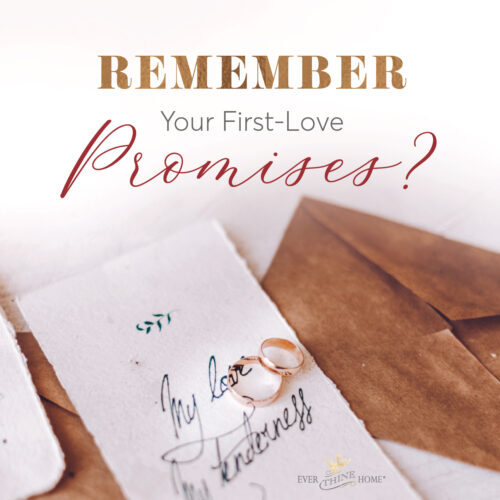
It was a warm, early summer day when Dennis invited me to go to lunch. We’d known each other as friends for three years in college, but we hadn’t seen each other in a year since graduation. So we had a lot to catch up on.
One lunch wasn’t nearly long enough. So he invited me to go on a picnic the next day. And a picnic still wasn’t enough. On the way back to my apartment, he asked me to go to church with him the next day.
And so began a month of daily dialogue—sharing rides to work, dinners, and walks after dinner. The talking never ran dry. He listened to me as it seemed no one ever had. I felt comfortable with him like no one else. Our relationship was easy and natural.
Within two months, this long conversation led to a decision to get married—a conclusion we both reached after praying for God to show us His will.
But like every married couple since Adam and Eve, we found ourselves in places where the early ease was replaced by discomfort, disagreement, or difficulty we never saw coming. The springlike oneness that was so real when we married dissipated like dew under the midsummer sun; our promises were put under fire like dry, sun-baked clay.

How do we move in marriage from the excitement of first love to a determined, mature love that lasts a lifetime? How do you move from expectant “I do” to an equally excited conviction of “We still do”?
A definition of “oneness” is a start: This is a biblical word meaning an invisible transcendent quality of perfect harmony. Why is this definition helpful? Because it is what God intends for you. Experienced perfectly by the Trinity, it is also what Jesus prayed for us! And we surely need His prayers because we married couples are not just imperfect but also incapable of achieving the oneness we married for.
How then do we recover that invisible but very real and needed quality that once lived between us? It’s not impossible. We’ve tasted oneness. The answer is going to Him, the source of what we need.
1. Ask God to reveal the truth. A heart examination is the place to start. And not your spouse’s heart. Examine your own. It is the special work of the devil to divide us. Jesus called Satan the father of lies (John 8:44), so start by asking yourself, “What lies am I listening to? What lies am I believing? Am I assuming the worst about my spouse?” It’s so easy to do. Begin by praying for eyes to see what is in your heart.
2. Ask God what has come between you if you aren’t sure. He who knows all wants you to know because His greatest desire is always reconciliation and restoration. He longs for you to say you still do.
3. Ask God to guide you to have an honest, authentic conversation with your spouse. All couples will have relational habits built over months and over decades. Recently my husband said that he hated asking me to go anywhere with him. It was an overstatement because he didn’t really mean anywhere. What he meant was going with him on ministry/business trips.
For years I had let him know how challenging these trips were for me as a mom and for my personality. I don’t enjoy small talk and networking with strangers.
But I have changed. I had a conversation with God one day and let go of my need to control, to make circumstances fit my needs. I told God I was grateful my husband wanted me to go with him at all.
I asked God to help me be positive and not negative about my husband’s desire that I always be with him. I asked God to help me enjoy every minute of this relationship. Of course I haven’t done this perfectly, but I have improved.
4. Ask God for patience with growth in oneness. The Bible calls us oak trees of righteousness (Isaiah 61:3), and oaks don’t grow overnight. You want your oneness to have the strength of an oak, not the perishable quality of a squash vine.
Trust God even when your conversation may not resolve the issue immediately but may require countless additional conversations. Remember patience is what you are practicing. You may not like those multiple conversations, but they are worth it. In God’s hands and timing, He will work the good you desire, help you both to better understand each other, and increased oneness will be the result.
As you work toward oneness in your marriage, begin where you are. Risk talking about the hard things with your spouse because when you work through these obstacles, the joy on the other side is so worth it. It’s what will allow you to enthusiastically say together “We still do!”
So pray for God to grow you together. Offer this prayer as a start:
Jesus,
We married for oneness,
companionship indivisible.
Increase my vision.
May our marriage be
all that You imagined
when you brought us together.
For Your glory and our good.
Amen.
The post Remember Your First-Love Promises? appeared first on Ever Thine Home.
February 3, 2025
Modeling Respect in Our World Today


Did your parents teach you to respect others? And I’m not just talking about respecting authority figures like teachers, the school principal, your pastor, grandparents, and other adults. Did they teach you to respect your friends, your neighbors? Did they teach you to respect people you disagree with or those who are different from you?
For parents, teaching respect often starts with helping your kids know how to respect adults. I grew up in the Midwest, in northwest Indiana, as a baby-boomer child who, along with all my peers, learned to address adults with a deference that acknowledged their greater life wisdom. Teachers were always addressed with a surname first: Mr., Miss, or Mrs. I never even knew that adults in my life had first names, except my parents’ friends Rita and Bud. Of course I never called them those names: they were still Mr. and Mrs. McFadden to my brothers and me.
Years later when Dennis and I raised our kids in the South, I taught my little ones to say, “Yes sir” and “Yes ma’am” like other parents did as a way to demonstrate honor to adults. I didn’t demand they say it all the time; I just wanted the concept to be in their vocabulary. And I’m glad I did.
But it doesn’t stop with adults. One of our jobs as a parent is teaching our kids how to love and respect any person in their lives—their siblings, their friends, the people they encounter each day. And why is this important? Because every human being in made in the image of God so therefore every person had innate value. Being in His image means you and I reflect Him by what we say and do.
Teaching children this concept isn’t easy because communicating about God isn’t easy with children, or adults for that matter. But as you teach this idea and reinforce it yourselves and as you see them respecting others as God would desire, the concept will take root and grow.
Our country lost its once understood-by-all respect for all people decades ago. The only way to change this shameful national pattern is to start at home. It will be the next generation who might influence our national moral values.
Make respect a value in your home. Teach it and practice it yourself. The conviction, “It’s not what is taught but what is caught” will mold your children for the future. As you talk in your home about political leaders, your pastor, neighbors and extended family members, be very careful that how you talk about these people your children know will impact them for life.
And remember if your children have any access to social media or news outlets they will see boasting, arrogance, rudeness, and selfishness that insists on its own way, which 1 Corinthians 13:4-5 plainly says is not becoming: “Love does not boast, is not arrogant or rude, does not insist on its own way…”
Practically, how can parents model this valuable character trait with our children when we can guarantee it’s not being taught or modeled outside of our homes?
God answers this daunting question with a simple requirement. He calls us to always love one another. John 13:34-35 says, “A new commandment I give to you, that you love one another: just as I have loved you, you also are to love one another. By this all people will know that you are my disciples, if you have love for one another.” This love then produces respect for people, even people we don’t like, don’t trust, or don’t enjoy.
February is the month we think about love because of Valentine’s Day. Looking to Jesus, who is love incarnate and the author and perfecter of our faith, we choose to imitate Him as we relate to others. Jesus respected the woman at the well who had five husbands. He talked to her and listened to her, which made her feel noticed, appreciated and valued. Her neighbors and even the disciples would have looked down on her as inferior for her serial marriages, and so would we. But Jesus wants us to show common respect for everyone just as He did.
Here are some questions to help you evaluate how you are currently modeling respect:
1. As parents are you modeling respect every day at home in your marriage? What kind of tone do you use with your spouse? Do you speak with contempt? Are you flippant or coarse or impolite? Are you arrogant or rude? Your children will copy what they see and hear.
2. Do you relate to adults in your everyday life with respect? For example, the checkout person in the grocery store, your neighbor who always parks his car too close to your driveway, or the parent of the always-in-trouble child in your daughter’s first grade classroom. What do you say that your kids hear? What kind of disrespectful facial expressions do you use that they see? Eye rolls or sighs?
3. Do you take time to respect those who aren’t like you? Do you look them in the eye, show kindness, listen if they have a story to tell? Love seeks to understand another’s point of view. Love sets aside our personal plots to understand pain in someone else’s eyes. Listen to others as individuals. And when it comes to politics, listen more to the words of Jesus than to the words of media. I find it interesting that Jesus said others will know we are His disciples by the love we show … and I’m pretty sure He wasn’t speaking just of people whose beliefs we share.
4. Do you respect your neighbors or coworkers who may not share your faith or values enough to open your home with hospitality? Jesus showed consideration and compassion, especially to those who didn’t deserve it. This is hard for us because we resist moving outside our comfort zones.
Remember how He treated a greedy, hated, thieving tax collector named Zacchaeus? Jesus ate dinner with him. In his own house. As his friend! And we know Jesus didn’t agree with Zaccheus’ life choices. He still showed honor and respect … love … to this person. And Zacchaeus was changed forever.

It’s easy to show love and respect to people who believe like you, vote like you, look like you, or dislike the same things you dislike. Real love, God’s genuine love that we are commanded to show to our hurting world, treats every person with honor and respect. Love says age doesn’t matter, gender doesn’t matter, status doesn’t matter, race doesn’t matter, theological differences don’t matter. Real love treats every person with dignity based on every individual’s innate worth as an image bearer of God.
5. To show respect in every relationship, start with what you can control. In your marriage, with your children, with your coworkers, extended family members, remember you can’t change the other person, but only yourself.
Author G.K. Chesterton was once asked, “What’s wrong with the world?” His reply was profound. He said simply, “I am.” Chesterton respected his personal depravity enough to claim his own part of the problem.
We must respect the truth of God’s Word that says we are all wicked. None of us is good on our own. Look to your own fault, your own wrong first, instead of pointing the finger in blame at someone else.
Love came to us to teach us to respect one another. Only Jesus can help you do this by the power of His Spirit who lives within believers. Ask Him to help you today.
Prayer: God help me recognize that my heart is incapable of loving as I want to love, as Jesus wants me to love. I cannot love and respect others if I think I am better than them. Being good only on the outside will never fix the problem in my heart. Amen.
P.S. I’d love to hear your story of what your parent or even a grandparent taught you about respect. I’ve always felt respect is something I can recognize easily, and disrespect in a kid I can spot a mile away, but I’ve found it difficult to describe this trait as clearly as I’d like in words. So help me out if you’d like!
The post Modeling Respect in Our World Today appeared first on Ever Thine Home.
January 20, 2025
Beyond Weight Loss: 3 New Year’s Resolutions for Your Soul


I imagine that most New Year’s resolutions are forgotten by now!
Most people who make resolutions are deadly serious when they begin. But after a few weeks, after they’ve failed a few times in cutting calories or reading the Bible daily, they give up. Well, here are some resolutions that are worth considering because they will change your life.
Resolution #1: Nurture Your Marriage
Not one New Year’s resolution list that I’ve seen has a single declaration about marriage.
Yet stable healthy marriages are the bedrock of secure societies worldwide. More important than exercise, staying hydrated, and cutting out sugar is cultivating a heart devoted to strengthening your marriage.
In all relationships Jesus is our model. Here is a simple yet impossible formula for your marriage. Simply stated resolutions:
Don’t be selfish … don’t look out only for your own interests.Do have the mind of Christ … the attitude of serving your spouse in love as Christ served us and loved us.Just reading this short list reminds me I’m a failure. You too? I have learned it is impossible for me to do these things in my own ability and power. That’s good; I finally am resigned to my inabilities.
Here is what makes the impossible possible:
Admitting I can’t change myself, much less my spouse. Selfishness is my natural inclination. “Me first” is always easier than “you first.”Understanding how to balance the command to “Let each of you look not only to his own interests, but also to the interests of others” (Philippians 2:4) is impossible for me but entirely possible for Christ in me.Having the mind of Christ is the only hope for any marriage at any season or life stage.To help you get started, pray these words: “My Jesus, thank You that nothing is impossible for You! It is Your Spirit in me that transforms my attitude, my heart, my motives, and my desires into conformity with Your example of humility in my marriage and all relationships.”

Remember: If you choose to make your marriage your number one resolution for this year, feeling incapable is a good place to be. The impossible standard of holiness God calls us to forces us to be utterly dependent on Him.
I pray you will join us in making this resolution number one on your list. And I pray you will ask the Spirit of God to make you more like Jesus in your marriage.
You’ll be glad you did.
Resolution #2: Be Still
Winter is the perfect time to begin acting on this resolution—to begin, perhaps begin again, a new habit of being still. We sang a few weeks ago, “the world in solemn stillness lay” and “all is calm, all is bright” … perfect descriptions of the quiet of winter, invitations to hush our too-busy lives in reverence for His ever-near presence.
Here are three ways to “Be still and know that I am God.”
Go for winter walks. Feel the hush of winter’s cold that sends most living things into hibernation, silencing the cacophony of summer’s sounds. Look up at the beauty of long limbs carrying hundreds of branches heavenward; each tree a maze of intricate patterns and shapes, cathedrals of wonder and worship. Recognize there the grandeur of the Creator. Be humbled by your small place in relation to Him. It is good to remember, “what is man that you are mindful of him, and the son of man that you care for him?” (Psalm 8:4).
Be still in this place.
Set an alarm on your watch or phone and, when it sounds, remember God’s faithfulness … as dependable as the clock regulated by the earth’s fixed yet constant movement, and as secure as the steadily revolving seasons. “While the earth remains … summer and winter, day and night, shall not cease” (Genesis 8:22).
Be still in this moment.
Read for your soul. Social media too often steals our peace, satisfaction, and rest. Instead feed on good books.
Choose wisely. My long-distance friend, Allison Burr, wrote, “unusual amounts of output = dire need for recharging, which is most rapidly and rewardingly accomplished through books.” If you aren’t sure what to read, anything by C.S. Lewis, Tim Keller, Madeleine L’Engle, J.R.R. Tolkien, or other classic authors will enlarge your vocabulary, challenge your thinking and feed your soul.
Be still in your heart.
“Help me Lord to make moments to be still, to order my life to receive winter’s treasures, to feed on You daily. Amen.”
Resolution #3: Embrace Your Body
“What lust is for men, comparison is for women,” said my friend Joanne. She is right.
Each year we see evidence of the perpetually ugly sin of men, even old men, lusting after women … again and again and again.
We rightly say it is evil, selfish, and often an abuse of power.
But do we women see our perpetual self-loathing, our self-comparison with every image, every friend, every woman regardless of age, as ugly? Selfish?
We do not.
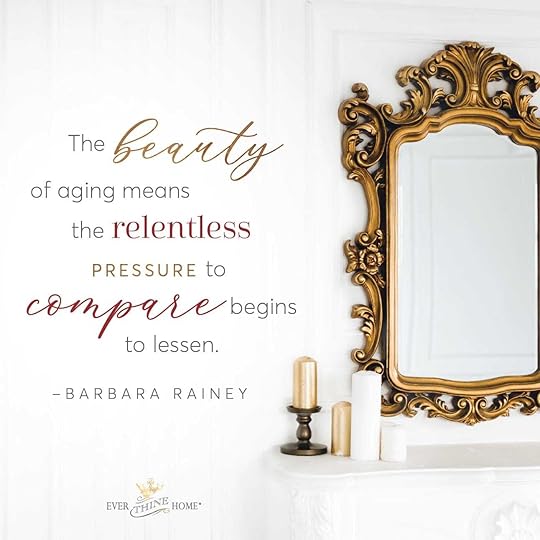
For many women, the beauty of aging means a reduction of the relentless, competitive pressure to compare ourselves to others. But while my criticisms of my body, my face, my weight, my abilities, have become less frequent and harsh, still they have not gone away.
So what do we do? Here are some suggestions:
Admit our constant comparison is an ugly sin that hurts God’s heart, rejects His love, and dulls the beauty of holiness He desires to light inside each of us.Ask God to make us aware of every single glance and thought of comparison as we walk the grocery store, church, and restaurant aisles.Speak a simple, repentant prayer every time criticism or coveting arise in your heart as you scroll through social media: “Forgive me, Lord, for thinking myself better than this woman, or less than that woman, desiring what You have not chosen to give me”Thank Him that He made you as you are for reasons He knows are best.Ask the Creator God who made you to give you His admiration and satisfaction with His intentional design.In His famous sermon on the mount, Jesus explained that adultery was not only a sin when sex was performed; He took it to the heart by saying, “But I say to you that everyone who looks at a woman with lustful intent has already committed adultery with her in his heart” (Matthew 5:28).
Number 10 on the list of commandments God wrote with His finger on stone tablets was, “You shall not covet … anything that is your neighbor’s” (Exodus 20:17). Wanting, desiring, longing for anything someone else has is a sin of the heart.
Do you desire to please God? Would you like to make Him happy? Here is how to do that in 2025: “Do not look on … appearance … stature … For the LORD sees not as man sees; man looks on the outward appearance, but the LORD looks on the heart” (1 Samuel 16:7).
Make heart change your resolution for 2025:
Nuture your marriage (reject selfishness).Be still (choose to pause and listen).Embrace your body (give thanks for His design).The post Beyond Weight Loss: 3 New Year’s Resolutions for Your Soul appeared first on Ever Thine Home.
January 13, 2025
Learning to Love Others as Jesus Loved Us


This email contains an exciting announcement that many of you have been asking about for a long time, so KEEP READING!
With Valentine’s Day coming soon, you might be surprised to know that its historical roots are not about romantic love. In fact all love originates with God who is love (1 John 4:8) and while married love is from Him too, most of us need to focus this holiday on loving one another as Jesus taught us before He went to the cross.
And perhaps it is not surprising to know that none of us loves well. Frankly, it’s just easier to be selfish. And that is the root of what’s wrong with our world.
The Bible says, “The heart is deceitful above all things, and desperately sick; who can understand it?” How about that for a cheerful Valentine thought? But it’s true. In our world we are told that to love well we need to “follow your heart.” In fact, loving well often means rejecting the feelings of your heart and, instead, allowing the Spirit of God to love others through you.

Like the impossibility of learning to swim without getting in the water, so learning how to love cannot happen without getting into a relationship with God. Thankfully, Jesus meets us in shallow waters, helping us face our fears and growing our trust in His strength. Then, if we are brave enough, He leads us to swim in the deep sea of His love.
To help you learn more about loving as Jesus loves …
Our “How Do I Love Thee” Valentine heart cards ARE BACK!!!!

In our Etsy store you will find a kit with 15 heart-shaped cards, one an introduction and then 14 cards with each of the 14 characteristics of love found in 1 Corinthians 13, the famous “love chapter” of the Bible. Twine and small clothespins are also included.
The Bible tells us God is love and Jesus said, “If you had known me, you would have known my Father also” (John 14:7). In fact, when you read the descriptors of love in 1 Corinthians 13, you can substitute Jesus’ name whenever the word “love” is written—“Jesus is patient and kind. Jesus does not envy or boast …” This is how God loves you and He asks us to love one another the same way.
Starting on February 1 read the introduction card and the card for day one with your family or alone for personal devotions. After reading it, hang the card on the twine with one of the included clothes pins. Or hang all 15 cards and remove one each day. By Valentine’s Day your family will have walked with others who have learned to love as Jesus did and have much to teach us from their example. And you will have enjoyed a lovely Valentine decoration as these pale pink cards hang across your fireplace mantel or a window.
I hope you’ll hurry to our Etsy store and get your set that can be reused every year for longer than your children will be in your home! Or buy a set for a friend who can’t afford one, or for a neighbor you want to know God. If you’re a grandparent, buy them for your grandchildren and their parents!
Make Valentines in your house about learning to love like Jesus did.
May you grow together in the wonder of being loved unconditionally by God and learn to give love generously to others!
As a bonus, here is the text from one of the cards in the “How Do I Love Thee” set:
Love Does Not Insist on Its Own Way
Love looks for and listens to the needs of others.
Love does not think about what is best for one’s self.
Love listens to the guiding whispers of the Spirit of God.
Right here near the center of the 1 Corinthians love list is the crux of our heart problem: We cannot love if we insist on our own way because selfishness always pollutes love. Only by listening to the Father, as Jesus listened, can we love purely.
To love like Jesus starts with the great commandment, “You shall love the Lord your God with all your heart and with all your soul and with all your mind … And a second is like it: You shall love your neighbor as yourself” (Matthew 22:36-40).
One day in 1957, Paul Holderfield stood with his fellow firefighters yelling hateful things at a group of African-American men who were marching for integration. Out of the crowd of marchers stepped his childhood friend Jimmy, who bravely walked up to Paul to shake his hand, but Paul refused. Later that day Paul wept because of what he’d done.
Soon afterward Paul began helping feed hungry children at a local Boy’s Club. And then he gave his life to Jesus. The change in his life was dramatic. Paul gave up bad language. He stopped drinking and smoking. And he had a new heart that loved people of all colors.
Friendly Chapel was started by Paul and his family because he wanted a church where he could live out the Golden Rule. In a neighborhood of North Little Rock, Arkansas, with the highest crime rate at the time, the fledgling church began. They opened a soup kitchen to feed the homeless, a thrift store to clothe the poor, and always lovingly welcome anyone who walked in the door.
Paul Holderfield’s greatest desire was to be a sermon seen—to show Jesus by loving his neighbor as himself.
He was a simple man who didn’t insist on his way but only on Jesus’ way. He would tell us it’s okay that we aren’t perfect, that we just have to tell God we don’t know how to love well and then get up and keep trying.
Prayer: Jesus, I cannot change my selfishness, but I can ask You to give me eyes to see my neighbor who needs Your love. Help me listen to Your voice and obey what You ask me to do. May all my thoughts be true, my love be pure, and my actions be right before You today. Amen.
The post Learning to Love Others as Jesus Loved Us appeared first on Ever Thine Home.
Barbara Rainey's Blog
- Barbara Rainey's profile
- 24 followers




